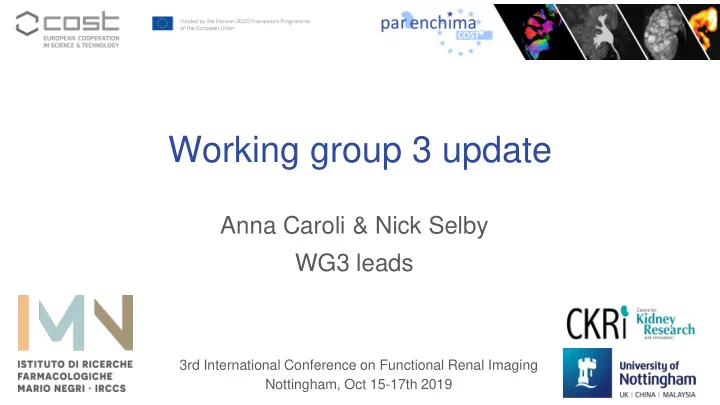

Working group 3 update Anna Caroli & Nick Selby WG3 leads 3rd International Conference on Functional Renal Imaging Nottingham, Oct 15-17th 2019
WG3 – working group overview WG3: aims to join up clinical sites working on renal MRI WG3 leads: Anna Caroli & Nick Selby WG3 participants: n=85 people from 46 clinical/research centres/SMEs from Europe and beyond Overall objective: demonstrate biological validity and clinical utility of renal MRI biomarkers; pave the way for clinical use of renal MRI by providing stronger evidence for their use in patients 2
WG3 achievements Last year: series of papers on MRI biomarkers in renal disease ( NDT special issue , September 2018 - https://academic.oup.com/ndt/issue/33/suppl_2) We increased the awareness within the nephrology community about potential of renal MRI 3
Clinical study document repository Collection of documents about ongoing/completed clinical studies involving renal MRI Designed to speed up the set up of future multicentre clinical studies Trial documents - Protocol - Informed Consent/Information Sheet IRB/IEC and other approvals - Advertisements for Subject Recruitment Imaging documents - IRB/IEC Submission Non-imaging documents - Data Privacy Agreement Imaging Standard Operating Procedures - Submission to other committees Non-imaging biomarkers collected - Letters to General Practitioners (SOP) - study and site-specific alongside MRI data - Upload of documents is voluntary and not compulsory - Documents do not need to be translated - Fixed naming convention proposed to make the repository searchable: Country_Disease_Study_YY.MM.DD.V.VV_DocumentName 4
Study documentation repository The repository is hosted on cloud The repository is not public - access restricted to PARENCHIMA members willing to contribute/access * Get in touch with repository coordinator to access the repository * Contacts Repository coordinator: Kristina Holm (Antaros Medical, SE) kristina.holm@antarosmedical.com Technical support: Marcos Wolf (Medical University of Vienna, AT) wolf.marcos@gmail.com 5
Multicentre studies – barriers and possibilities Major barriers to multicentre studies : Standard MRI protocols needed WG1 recommendations Substantial funding required for large scale studies Difficult to obtain funding that extends beyond single countries Possible approaches - Multinational grant funding - Multicentre studies performed and funded within single countries - Single center - Modular approaches (co-ordinated approach for combining data from separate studies with similar designs) 6
Multicentre studies – possible approaches Multinational Multicentre, Single centre within countries - RESPECT - Swiss efforts Several ongoing clinical studies (IT/ES/DE/DK/UK; MRI standardisation (Geneve/Bern/Friburg; DWI in CKD) (on ADPKD, transplant, CKD, etc.) to improve CKD management) - UMCG-MHH project - UKRIN efforts (diagnostic potential of renal graft MRI (standardisation; CKD clinical study) for post-transplant complications) Not successful so far Successful, potentially scalable Successful, potentially scalable PARENCHIMA progress review: “ … overcome the problem of large-scale clinical studies … (by) … setting up national studies with national funders in a similar way to analyze the data of different countries together” WG1 delivered recommendation papers standard MRI protocols are now available Study repository in place easier study set up Re-discuss modular approaches to overcome multicentre clinical study funding issues: - Obtain funding and perform national-scale studies adopting similar study design and MRI protocols - Pool data to generate larger evidence 7
Next step: inventory of ongoing clinical studies List of ongoing clinical studies - both national and international - Study title, Disease area, Timeline, Funding agency, Contact person -> to coordinate the efforts and avoid possible overlap/competition -> useful for planning complementary research -> as a basis for creating possibly larger pooled cohorts in the future * Start-off the list during the WG3 break-out session * 8
WG3 task forces ADPKD task force joins up WG3 participants working on MRI in ADPKD Lead: Andrea Remuzzi (Bergamo, Italy) Aim: Share expertise and secure funding to further validate MRI biomarkers in ADPKD Transplantation task force joins up WG3 participants working on MRI in renal transplantation Leads: Cyril Moers/Ronald Borra (Groeningen, The Netherlands) Aims: - Promote collaboration in the field of renal allograft MRI - Share retrospective data to explore the diagnostic potential of MRI for post-transplant complications - Promote applications for assessing predictive and diagnostic potential of MRI sequences for pre- transplant (ex vivo) organ assessment and detecting and characterising post-transplant complications. * Task forces update during the WG3 break out session * 9
ESR biomarker inventory https://www.myesr.org/research/biomarkers-inventory/biomarkers-renal Which renal MRI biomarkers to recommend for clinical trials? This table was taken from the * we’ll try and reach a consensus in the WG3 session * PARENCHIMA position paper 10
Break out WG3 session (16.30-18.30) - Update from WG3 task forces (ADPKD/transplantation) Progress summary, Short term objectives, Timeline Anything to ask for (data/expertise)? - Inventory of active clinical studies undertaken by COST members - Discussion of proposed grants/funding strategies - Discussion of EIBALL statement of renal MRI biomarkers to recommend for clinical trials 11
Acknowledgement This presentation is based upon work from COST Action PARENCHIMA (CA16013), supported by COST (European Cooperation in Science and Technology). COST (European Cooperation in Science and Technology is a funding agency for research and innovation networks. Our Actions help connect research initiatives across Europe and enable scientists to grow their ideas by sharing them with their peers. This boosts their research, career and innovation. www.cost.eu 12
Recommend
More recommend